Please look below for the english version
Van Palenque, Mexico naar Leon, Nicaragua
‘wow that was a rough road, I hope the next part will be easier’. Ik houd mijn hoofd schuin zodat al het stof dat zich heeft opgehoopt in mijn oor eruit kan. Ik sta aan de grens tussen Guatemala en El Salvador. De woorden kwamen uit de mond van een jeugdig uitziende toerist die uit een busje met airco kwam. Op het eerste zicht had hij geen fysieke beperkingen die het uitspreken van deze woorden konden rechtvaardigen. Misschien was er een probleem met de vering van het busje, dacht ik. Zelfs in de koelte kan dat zwaar zijn voor de rug. Er moet toch echt wel een verklaring zijn voor de ontberingen die hij moest doorstaan. Ik kijk naar mijn tshirt vol zoutkringen dat ondertussen zelfstandig zou kunnen blijven rechtstaan en steek de grens over naar El Salvador.
Ik fiets in de zogenaamde bananenrepublieken. Dit zijn landen die economisch afhankelijk zijn van één exportproduct. Dat is een mooie manier om te omschrijven dat de landen economisch worden uitgebouwd door rijkere landen die bananen nodig hebben. Het hoeven niet noodzakelijk bananen te zijn. Bananenrepubliek klinkt waarschijnlijk beter dan kokosnootcontreien. De landen worden vaak omschreven als politiek instabiel, werden verscheurd door oorlog in de 2de helft van de 20ste eeuw en worden nog steeds geteisterd door geweld. Landen die je best kan vermijden of waar je, als het dan echt moet, best zo snel mogelijk kan doorfietsen. Maar ik heb ontdekt dat het met landen net is zoals met ziektesymptomen, je kan het beter niet googlen of je bent dood voor je het weet.
Mijn beeld van Centraal-Amerika werd gevormd door Paul Theroux’s Mosquito Coast, dat zich afspeelt in Honduras. Stoffige wegen of helemaal geen wegen, moerassen, hitte, een meedogenloze plaats waar je naartoe gaat als je van de kaart wil verdwijnen. De realiteit is lichtjes anders. Fictie is misschien dan toch niet de beste bron van informatie om een samenleving te begrijpen. Het is zoals Assepoester lezen om te leren hoe je moet poetsen.
Ik denk steeds dat ik meer moet lezen over het land waar ik door fiets. Latijns-Amerikaanse geschiedenis is onbekend terrein. In El Salvador verbleef ik bij José en zijn familie. José vluchtte uit El Salvador tijdens de oorlog en besloot om enkele jaren geleden terug te keren, met de fiets. Ik vroeg hem of hij vond dat het belangrijk is om de geschiedenis van een land te kennen als je er door reist. Hij vertelde me dat in El Salvador de machthebbers van tijdens de oorlog nog steeds aan de macht zijn. De gewapende bendes zijn een belangrijke electorale massa. Politici proberen hun stemmen te kopen en in ruil krijgen de bendes privileges. De bendes worden groter en machtiger en het geweld neemt toe. Dat is waarom het belangrijk is de achtergrond van een land te kennen. De oorlog eindigt niet als de wapens zwijgen. De gevolgen zijn nog decennialang merkbaar en zijn een rem op de ontwikkeling van het land.
Ik merkte hier weinig van tijdens mijn tocht door El Salvador. Ik reed met een grote boog rond San Salvador en leerde een mooi land kennen met vriendelijke mensen. Ik at pupusas tot ik een indigestie kreeg en at er dan nog een paar. Pupusas zijn het nationale gerecht van El salvador, maistortilla’s gevuld met kaas en bonen.
Mijn tocht door Centraal-Amerika startte in Belize. Belize is een beetje een buitenbeentje in Centraal-Amerika. Het land was een Britse kolonie, er wordt Engels gesproken en het is meer dan andere Centraal Amerikaanse landen een smeltkroes van culturen.
Andere fietsers hadden me gewaarschuwd voor de steile beklimmingen in Guatemala. En steil was het zeker. Op mijn kleinste versnelling kroop ik naar boven. Maar al die inspanningen werden beloond met prachtige uitzichten. In Tikal, één van de grootste steden van de Mayas hoorde ik een toeriste zeggen ‘I have been here often enough it is just a bunch of stones’. Dat moet niet gemakkelijk zijn voor die vrouw, om steeds te moeten teruggaan naar één van de hoogtepunten van de beschaving. Guatemala is heel mooi en kleurrijk en de bergen zijn adembenemend. Het enige minpunt was dat iedereen “Gringo, Gringo” riep, als ik voorbij fietste. Dit betekent vreemdeling. Telkens mensen Gringo naar me riepen, stak ik mijn hand op. Talk to the hand cause the face don’t want to hear it.

Ik fietste ook 2 dagen in Honduras, waar ik leerde hoe je fruitsap moet drinken uit een plastieken zak. Ik at er ook 8 bananen in 24u.
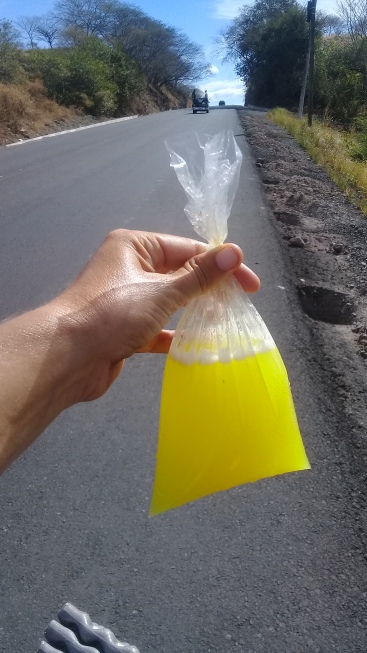
Dit is een nieuw persoonlijk record en een gepast eerbetoon voor de bananenrepublieken van Centraal-Amerika, waar de wegen ruw zijn, de archeologische parels enkel een hoop stenen zijn en waar je beter gewoon naartoe kan gaan in plaats van ze te googlen.
Don’t Google countries
From Palenque, Mexico to Leon, Nicaragua
“wow that was a rough road, I hope the next part will be easier.” I tilted my head so that all the dust that had accumulated in my ear could escape. I’m standing at the border between Guatemala and El Salvador. The words were uttered by a 30-something tourist emerging from an air conditioned minivan. At first sight he didn’t have any visible physical challenges that would justify these words. Maybe there was an issue with the suspension of the van. Even in an acclimatised environment that can be quite heavy on the back. I figured. Surely there must be some kind of explanation for his hardship. I looked at my salt stained t-shirt that acquired the crispiness of a tostada and crossed the border into El Salvador.
I’m cycling in so called banana republics. These are countries that are economically dependant upon export of a limited-resource product. This is a nice way to describe that the country is economically exploited by wealthier countries in need for bananas. Although it does not necessarily have to be bananas. I guess banana republic sounds slightly catchier than the coconut countries. These countries are often described as political unstable, war-torn countries where violence is an everyday reality. In short, a place to avoid at all cost or to cycle through as fast as possible. But, I discovered that countries are like medical symptoms, you better not google it, or you are already dead before you even got there.
My image of central-America was heavily influenced by Paul Theroux’s Mosquito Coast, which is set in Honduras. Dusty roads or no roads at all, swamps, heat, a relentless place where you would go to disappear from the map. It turned out to be quite different. A work of fiction might not be the best source of information to understand a society. It is like reading Cinderella to learn how to clean.
I’m constantly thinking I should read more about the countries I’m cycling through. I studied political science, but Latin-American history is a blank slate. The Latin-American entanglements of the cold war were only a small piece of the big puzzle. In El Salvador I stayed with José and his family. José fled to Canada during the war in El Salvador, a couple of years ago he decided to return to El Salvador, by bike.
I asked josé his opinion. Should I know more about the history of the countries I’m cycling through? He told me that in El Salvador the major parties of the war are still in power. Politicians try to buy the votes of the gangs in exchange for privileges which gives the gangs even more power. That is why it is important to know what happened. A war does not end when the war is over. Consequences of a war are tangible decades after and strain the country’s development.
While cycling through El Salvador, I did not notice anything about this. I bypassed San Salvador and got to know a peaceful and beautiful country with friendly people. I ate pupusas till the point of indigestion and beyond. Pupusas are corn tortillas stuffed with cheese and beans and they are the national dish of El Salvador.
My ride through Central-America started in Belize. Belize is a bit of an odd-one. It was a British colony, people speak English and it is a melting pot of cultures with Creol influences, Mayan culture and a very strong Chinese presence.
I was warned about the steep climbs in Guatemala by other cyclists. And steep they were. I bonded with my granny gear. We got to know each other quite well during that time. All the effort was rewarded with amazing views. In Tikal one of the centers of Mayan civilisation I heard a woman exclaim. “I have been here often enough, it is just a bunch of stones.” That must be rough for her, you know, to have to go back again. To be confronted time and time again with the wonders of human civilisation. I liked Guatemala a lot, it is a very colorful country and the mountains are spectacular.

Up next was Honduras. I was climbing up a road in Honduras when a 4wheeldrive stopped just before me. After we established where I was going and that it was very hot they offered me some orange juice in a plastic bag. In Central-America drinks often come in a plastic bag. That’s how I learned the indispensable skill to drink out of a plastic bag.

I also ate 8 bananas in 24 hours in Honduras which is a new personal best and a fitting tribute to the banana republics of Central-America where the roads are rough, and the highlights of civilisation are just a bunch of stones. Countries that are better to visit than to google.





















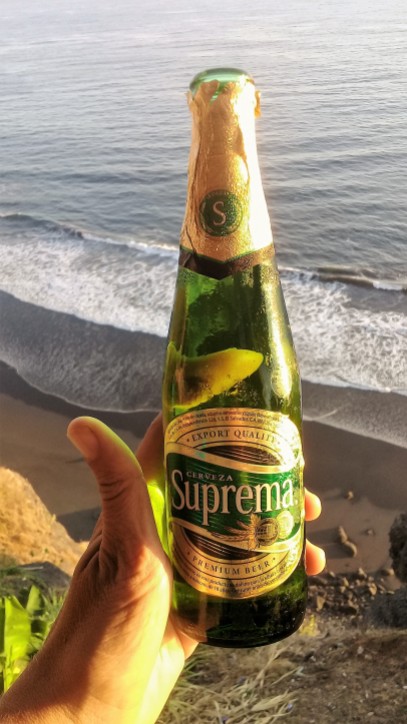





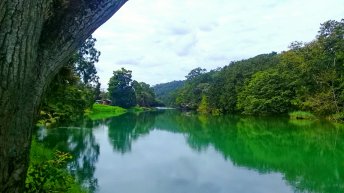
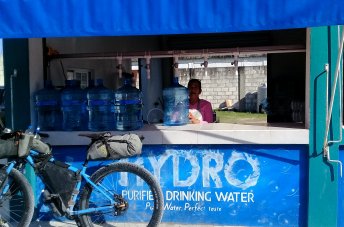
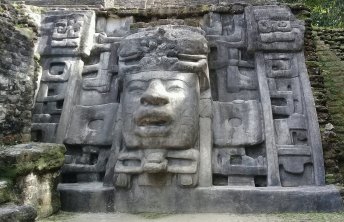









Hi Hilde, love the way how you look at things and how you are able to translate this into a great story. Keep on working on your calves girl! With love. Jacinta
LikeLike